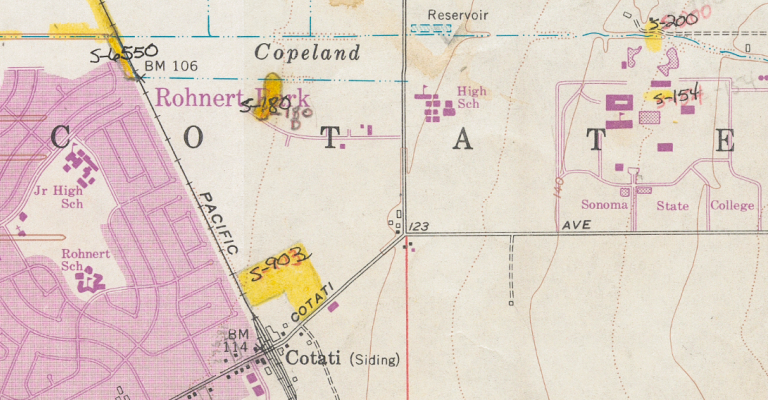Inventory Access
The NWIC maintains two types of inventory, based upon levels of access.
Archeology Inventory (Access Restricted)
Archaeological resources are nonrenewable and easily damaged—their legal significance or scientific, ethno-cultural, and aesthetic values can be impaired by disturbance. Access to this information is restricted, therefore, to prevent vandalism and artifact hunting, and to protect landowners from trespass. Those granted access to the archaeological archives of the Information Center (see access policy in Rules of Operation Manual (PDF)) sign an agreement of confidentiality whereby they agree to keep site content and location information confidential by not disclosing it to unauthorized individuals or including it in publicly-distributed documents. (California Government Section Code 7927.005 exempts archaeological sites from the California Public Records Act requiring that public records be open to public inspection.)
Access to Resource Site Records and Study Reports is restricted to these individuals under the following conditions:
- Cultural Resources Consultants: On January 11, 2013, the Center of the California Historical Resources Information System (CHRIS) Information Centers began using new Access and Use Agreements (PDF) with their customers. On July 29, 2016, the forms were updated via approval by the State Historical Resources Commission. The update was done to provide clarification regarding access by California Native American tribes to CHRIS Information held by Access and Use Agreement holders for purposes of lead agency notification of and consultation with California Native American tribes, pursuant to California Public Resources Code § 21080.3.1 (a part of the changes to the California Environmental Quality Act implemented in 2015 through AB52). In addition, a grammatical error was corrected in the second-to-last paragraph of the agreement recitals, and a minor change was made to make filling out the first page of the Agreement a little easier. All other language in the Access and Use agreement template remains the same as the 2013 version. Existing Access and Use Agreements that were executed using the 2013 version are still valid. Please review the Access Schedule.
To obtain a copy of the forms, use the links below or go to the Office of Historic Preservation (OHP) website.
CHRIS Access and Use Agreement (PDF)
CHRIS Authorized User Form (PDF)
CHRIS Conditional Use Agreement (PDF)
CHRIS Access Agreement Short Form (PDF)
In order for you to be added as an Authorized User under an existing CHRIS Access and Use number, you will need to sign and send to an Information Center other than the NWIC:
- a completed CHRIS Authorized User Form (PDF)
- a completed Statement of Qualifications (PDF)
- a copy of your resume/CV
Please feel free to contact our office with any questions or go to the OHP website for additional information about this process.
- Landowners who wish to know about archaeological sites (this is provided only for sites on your property) must confirm their request in writing along with proof of ownership (such as a deed or current tax statement which clearly links their name with an Assessor’s Parcel Map depicting property boundaries), and a Vicinity Map depicting the parcel in a larger context. If the landowner elects to have a representative, in addition to the above, that person must also retain a letter from the landowner authorizing the release of information to said representative. Copy and copy time fees may apply.
- Scholars should bring confirmation of their affiliation such as a résumé or student identification card, and if applicable, a letter from the supervising professor describing the project on which they are working. Access is considered scholarly if the individual is working on an unpaid project, such as a term paper, a graduate document, or a professional presentation. In general there is no fee when research is conducted in person (other fees apply). There is a fee, however, if research is conducted by NWIC staff.
Built-Environment (Access Unrestricted)
The NWIC’s built environment library is currently unrestricted. The public is encouraged to make use of the NWIC’s extensive built-environment database in order to learn more about the history of their community. In general, there is no charge for this research (other fees apply). Cultural resources consultants, working on paid projects, however are charged an hourly fee, whether research is conducted in person or by NWIC staff.
Continued Commitment to the Digital Transition
The Northwest Information Center has developed and maintains a Geographic Information System for the inventory of resources and reports for portions of our service area. In addition to the mapped locations of the resources and reports in a GIS, the associated documents for these resources and reports have been converted to PDF files.
As of January 9, 2020, paper maps have been archived for resources and reports for the following counties (for more info on the status of electronic data at other ICs, see the list at OHP website):
- Alameda (ALA)
- Contra Costa (CCO)
- Marin (MRN)
- San Francisco (SFR)
- San Mateo (SMA)
- Santa Clara County (SCL)
- Solano (SOL)
As of January 9, 2020, paper maps have been archived for resources only for the following counties:
- Del Norte (DEL)
- Colusa (COL)
- Lake (LAK)
- Napa (NAP)
- San Benito (SBN)
- Santa Cruz (SCR)
- Sonoma (SON)
- Yolo (YOL)


